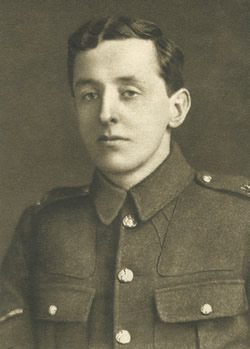Matthew Copse
by John William Streets (killed and missing in action on 1 July 1916 aged 31)

|
Once in thy secret close, now almost bare,
Peace yielded up her bountiful largess;
The dawn dropp'd sunshine thro' thy leafy dress;
The sunset bathed thy glade with beauty rare.
Spring once wove here her tapestry of flowers,
The primrose sweet, the errant celandine;
The blue-bell and the wild rose that doth twine
Its beauty 'round the laughing summer hours.
Here lovers stole unseen at deep'ning eve,
High-tide within their hearts, love in their eyes,
And told a tale whose magic never dies
That only they who love can quite believe.
Now 'mid thy splinter'd trees the great shells crash,
The subterranean mines thy deeps divide;
And men from Death and Terror there do hide -
Hide in thy caves from shrapnel's deadly splash.
Yet 'mid thy ruins, shrine now desolate,
The Spring breaks thro' and visions many a spot
With promise of the wild-rose - tho' belate -
And the eternal blue forget-me-not.
So Nature flourishes amid decay,
Defiant of the fate that laid her low;
So Man in triumph scorning Death below
Visions the springtide of a purer day:
Dreams of the day when rampant there will rise
The flowers of Truth and Freedom from the blood
Of noble youth who died: when there will bud
The flower of Love from human sacrifice.
There by the fallen youth, where heroes lie,
Close by each simple cross the flowers will spring,
The bonnes enfants will wander in Spring,
And lovers dream those dreams that never die.
Inspiration for the Poem “Matthew Copse”
John William Streets, known as ‘Will’, wrote about the inspiration for his poems in a letter to the poetry publisher, Galloway Kyle:
“They were inspired while I was in the trenches, where I have been so busy I have had little time to polish them. I have tried to picture some thoughts that pass through a man’s brain when he dies. I may not see the end of the poems, but I hope to live to do so. We soldiers have our views of life to express, though the boom of death is in our ears. We try to convey something of what we feel in this great conflict to those who think of us, and sometimes, alas! Mourn our loss.”
Unfortunately, Will's desire to live to see his poems published was never fulfilled.
On the first day of the Battle of the Somme, 1 July 1916, Sergeant John William Streets moved with the 12th Battalion York & Lancaster Regiment into the assembly trenches behind John Copse on the Somme battlefield. The attack was launched at 07.30 hours. Will's battalion went in on the second wave. Will was wounded and made his way back to the British line to get his wound seen to. He was seen going to help another wounded man but he disappeared.
Will’s body was missing for 10 months before it was identified; it was found in the area of No-Mans Land. On 1 May 1917 he was officially listed as “Killed”.
John William Streets is buried at Euston Road Cemetery, Colincamps. Reference: Special Memorial A. 6.
For the listing and location of Euston Road Cemetery go to:
Cemeteries of the Somme BattlefieldsRelated Topics
To find out more about John William Streets go to:
John William StreetsThe battlefield location where John William Streets and so many of his comrades died on 1 July 1916 is commemorated by a memorial park to the Pals Battalions of 31st Division:
Sheffield Memorial Park